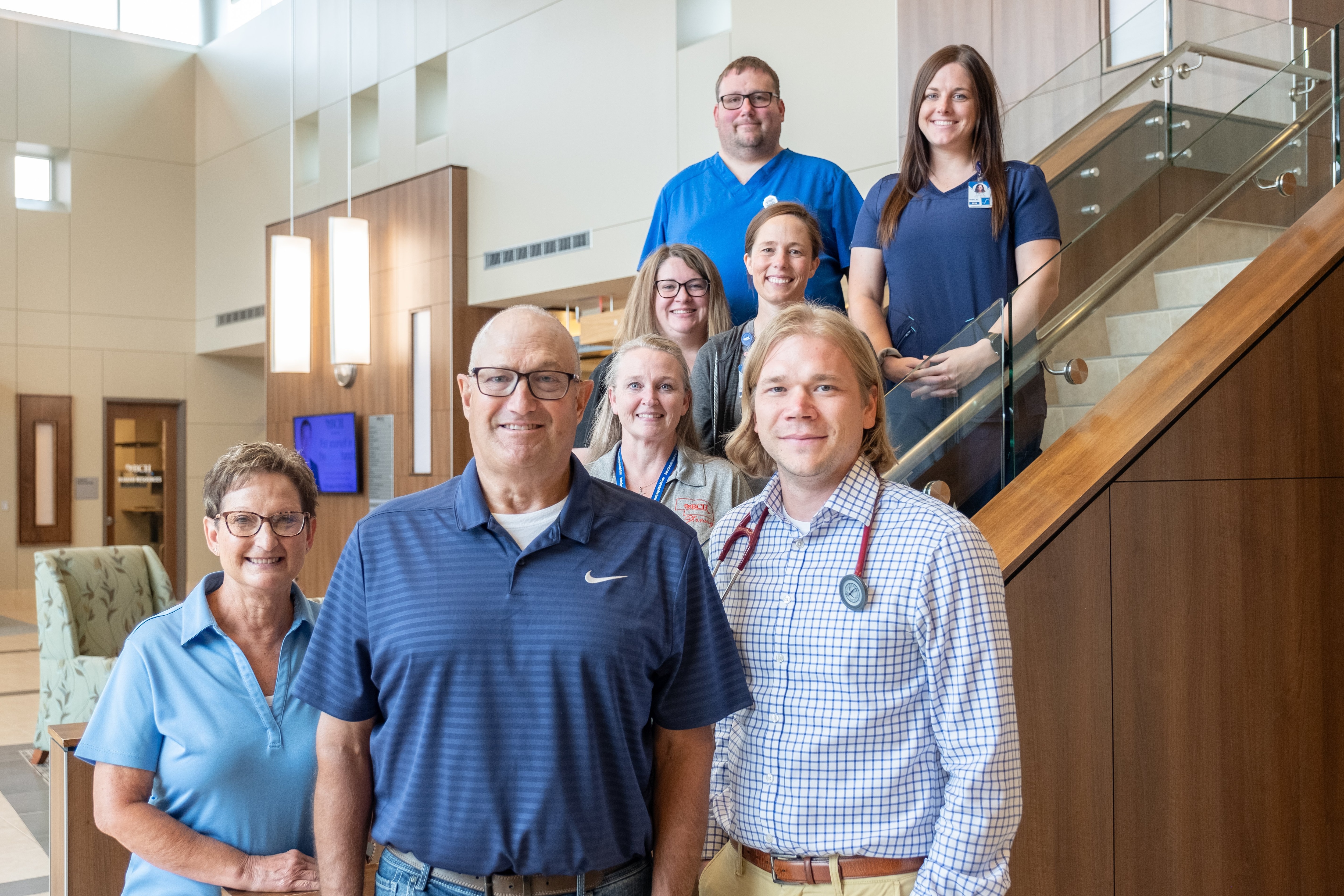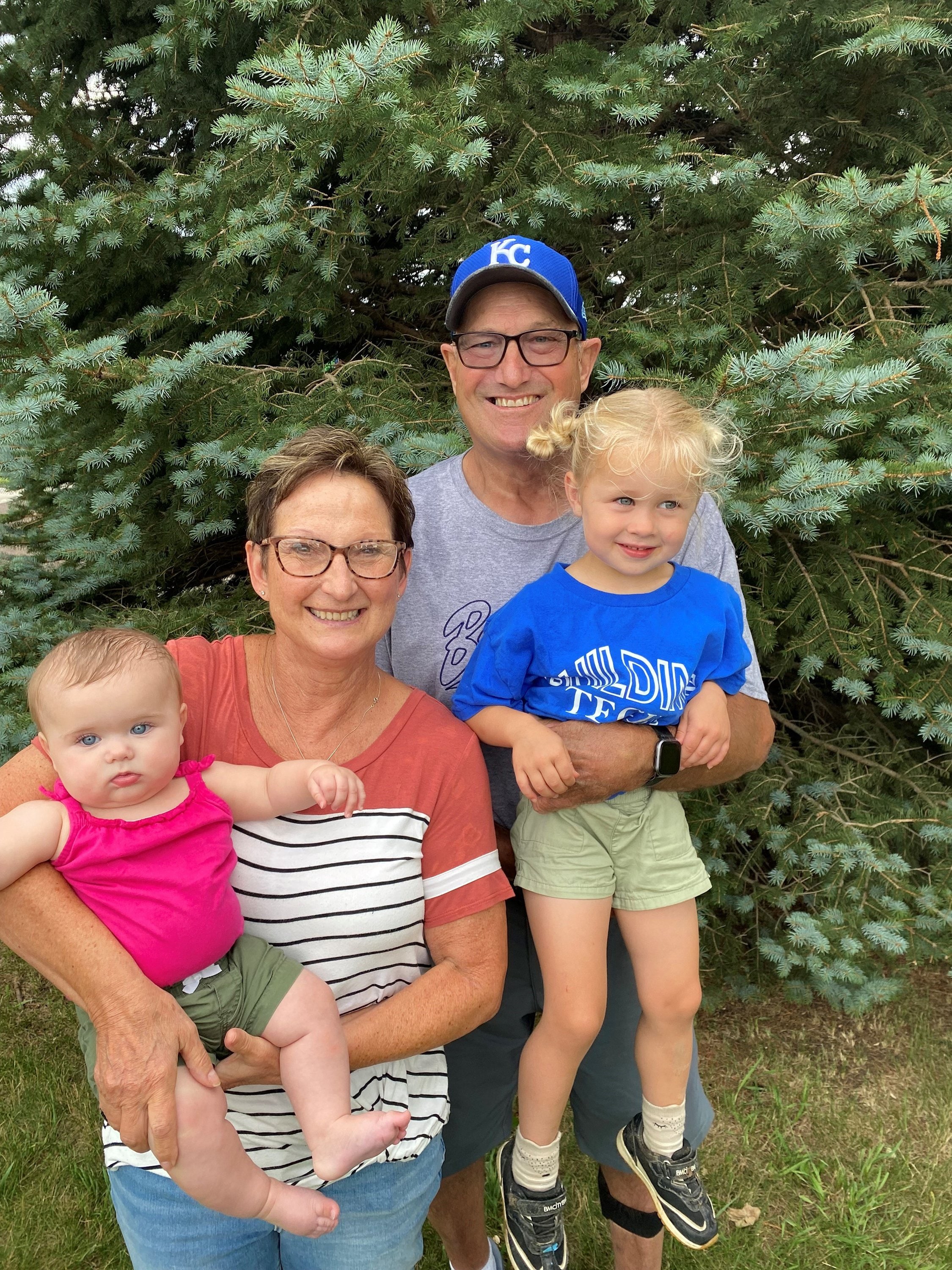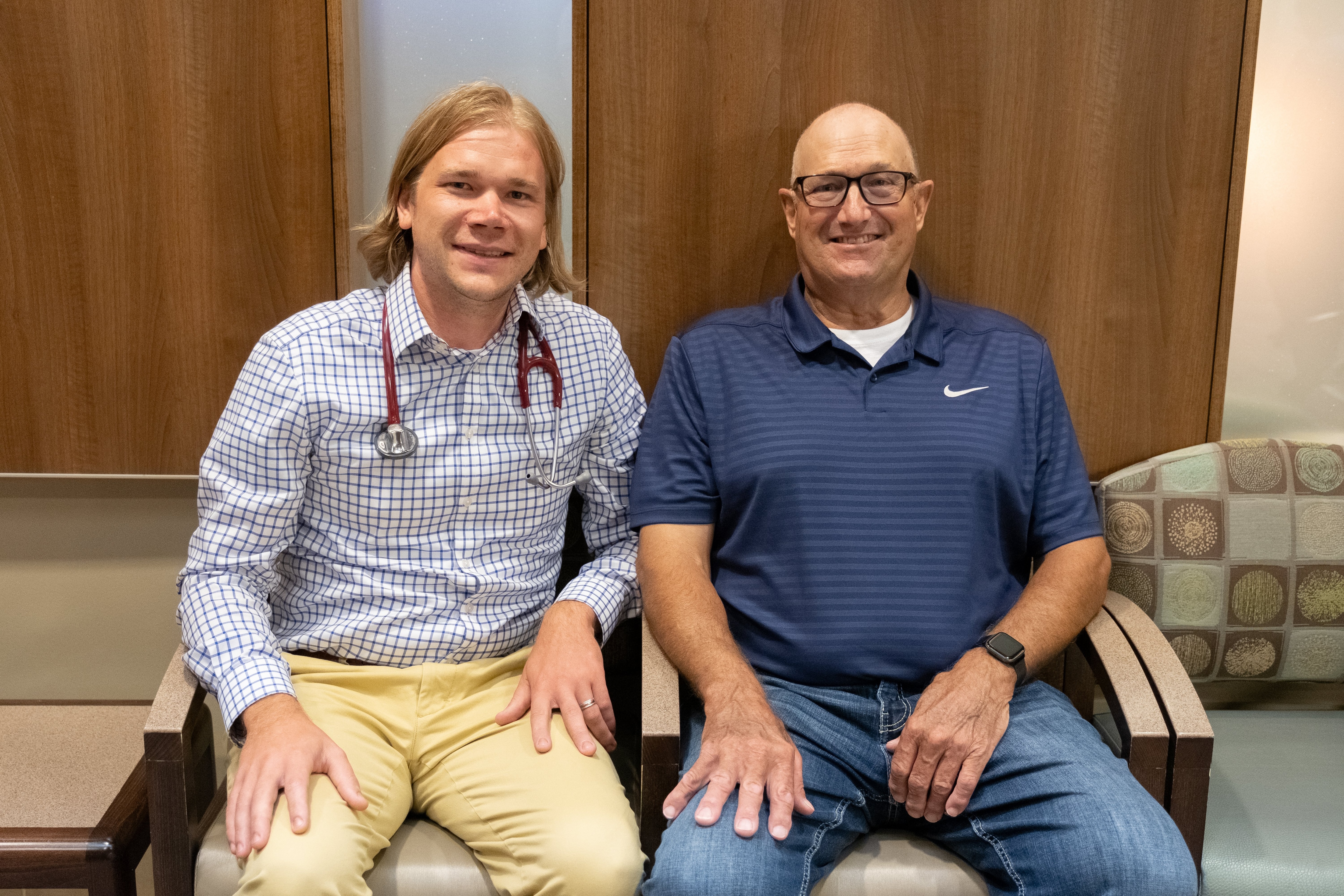Bryan Heart physician a "life saver" during waiting room cardiac arrest

Doug and Dianne Weishahn pose with Dr. Isaac Meier and some of the Beatrice Community Hospital staff who saved Doug's life that December day.
Dr. Isaac Meier had just started his day. The Bryan Heart interventional cardiologist had driven down to Beatrice last December for his usual monthly clinic while remotely attending a morning meeting. He walked into Beatrice Community Hospital, headphones in his ears as he listened to the meeting and mentally prepared for the day’s workload. That’s when he heard the cries for help.
“I heard what you wouldn’t expect to hear when you walk into the waiting room—stressful cries,” Dr. Meier said. The source of the cries was a woman whose husband had slumped over in his chair, completely unresponsive. Dr. Meier quickly checked for a pulse. There wasn’t one; the man had gone into cardiac arrest.

Doug has recovered well, allowing him
and Dianne to do what they love:
spending time with their grandchildren.
Rapid Response
The man, Doug Weishahn, is a farmer from the village of Western, Nebraska, where he has lived most of his life. His wife, Dianne, has worked as a patient concierge at the Beatrice Community Hospital for the past 13 years. The couple met on a blind date and have been married for 43 years.
While recovering from a 10-hour back surgery in October, Doug experienced atrial fibrillation—a type of irregular heart rhythm that can be a common occurrence after a surgery. Doug and Dianne were at the Beatrice hospital that December day for an appointment with Dr. Meier in their specialty clinic space.
Doug had been cleared to drive, so he drove himself to the hospital. Dianne, who had to work after the appointment, followed him. They walked up stairs to the clinic waiting room when Dianne said he broke out in a sweat and started to shake.
Dianne sat him down, thinking he was about to faint. He soon did, and Dianne ran up to the front desk to call a rapid response team. As she turned around, she saw Dr. Meier walk into the room.
Dr. Meier didn’t realize that Doug was his first patient of the day—they had never met before. But Dianne knew what Dr. Meier looked like from his Bryan Heart profile page. Once she saw him walk into the waiting room, she immediately went to him for help.
Dr. Meier rushed over to examine Doug. A back brace he was wearing to help with his recovery kept him upright. With the help of the reception desk staff and nearby nurses, he lowered Doug to the floor, removed his brace and started CPR.
While Doug was lucky to experience this episode while in a healthcare setting, he wasn’t around the typical live-saving equipment found in an emergency room or intensive care unit (ICU).
Thankfully, the clinic did have an Automated External Defibrillator, or AED. Dr. Meier applied the AED to Doug’s chest. He was taken to the emergency room at Beatrice and then was transported to Bryan Medical Center, where he was diagnosed with multivessel coronary disease. Dr. Ryan Shelstad, a cardiothoracic surgeon with Bryan Heart, performed open heart surgery to bypass three blockages.
Dr. Meier said he had never experienced anything quite like that moment. One second, he was focusing on a meeting and preparing himself for his day. The next, he was thrown into life-saving mode.
“It’s one of those things where we deal with it frequently, but this was just in a completely different environment,” he said. “We had to take a step back and say, ‘well, what’s available to us right now?’ You feel a little helpless because, in my role, you’re used to having so many tools in these situations.”
The importance of AEDs
Fortunately, Doug’s heart was stopped only for around a minute, so he suffered no heart damage. The proximity of an AED is a major factor in this outcome, Dr. Meier said. He is a strong advocate for AED accessibility, as he has one on hand in his car and house.

At these chairs in Beatrice Community Hospital waiting room, Dr. Meier found Doug unconscious after a cardiac arrest. The pair meet under much better circumstances here for Doug's regular heart checkup.
“I think AEDs should be everywhere,” he said. “It’s a necessity in sports venues and in most health clinics. Most public places should probably have one. The more people there are, the more likely you’ll need one.”
Dr. Meier sees the message about the importance of AEDs getting to the public but feels it’s one that still needs to be promoted. People can get uncomfortable when thinking about cardiac episodes, but Dr. Meier said they need to get over this hump.
“You have to do chest compressions, get the AED on and call 911,” he said. “If you do those things, I think you can walk away feeling like you did everything you could.”
Once Doug was stabilized, he met Dr. Meier in the capacity which he was originally intended—as his cardiologist. He will see Dr. Meier every three months for the foreseeable future for routine check-ins. Doug’s heart-health maintenance plan is standard, which is remarkable considering the severity of his recent episode.
“It’s almost a little weird in the sense that you connect him with a different outcome because of that day, but in terms of care, it’s actually very standard,” Dr. Meier said.
A Life Saver
Doug said he doesn’t remember much about that day in December—only getting to the hospital and feeling warm in the waiting room. But he and his wife will always remember what Dr. Meier did for them.
When the couple attended Doug’s first follow-up appointment, returning to the spot where he collapsed just weeks earlier, they brought Dr. Meier a token of gratitude: a bag of Life Savers® candies.
Dr. Meier paused to collect himself as he reflected on this gesture.
“It’s not that it was some big gift,” he said through tears. “I just felt so appreciated. I didn’t end up opening it in front of them, which I wish I had.
“In hindsight, it’s probably good because I would have cried.”
To subscribe to Journeys or read more stories like this one, click here.
To learn how you can support cardiac services, please contact the Bryan Foundation staff by calling 402-481-8605.

